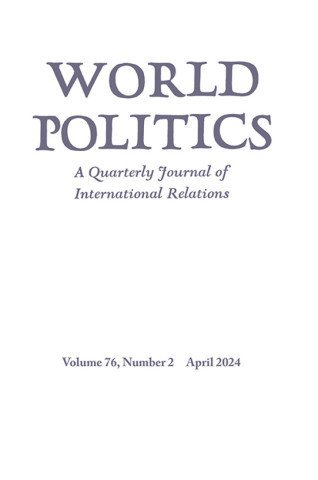外国援助和国家合法性
IF 2.5
1区 社会学
Q1 INTERNATIONAL RELATIONS
引用次数: 19
摘要
摘要外国援助对受援国合法性的影响是什么?不同的捐助者遵守不同的规则、原则和操作程序。作者认为,这些援助制度的变化可能会导致援助对国家合法性的影响发生变化。为了验证他们的理论,他们将美国的援助与中国的援助进行了比较,中国是美国最突出的地缘政治对手。他们的研究设计结合了对利比里亚原始调查、调查实验和行为游戏的国内分析,以及对六个非洲国家现有行政和Afrobarometer数据的跨国分析。他们利用多个国家合法性的代理人,但特别关注税收合规性和士气。与预期相反,作者发现几乎没有证据表明接受援助会削弱非洲国家的合法性。如果说有什么不同的话,那似乎恰恰相反。他们的结果在多个设置、多个分析级别以及多种测量和识别策略中是一致的,不太可能是样本选择、统计能力或特定实验处理的强弱造成的假象。作者得出的结论是,援助在微观层面对国家合法性的影响在很大程度上是良性的。本文章由计算机程序翻译,如有差异,请以英文原文为准。
Foreign Aid and State Legitimacy
ABSTRACT What are the effects of foreign aid on the perceived legitimacy of recipient states? Different donors adhere to different rules, principles, and operating procedures. The authors theorize that variation in these aid regimes may generate variation in the effects of aid on state legitimacy. To test their theory, they compare aid from the United States to aid from China, its most prominent geopolitical rival. Their research design combines within-country analysis of original surveys, survey experiments, and behavioral games in Liberia with cross-country analysis of existing administrative and Afrobarometer data from six African countries. They exploit multiple proxies for state legitimacy, but focus in particular on tax compliance and morale. Contrary to expectations, the authors find little evidence to suggest that exposure to aid diminishes the legitimacy of African states. If anything, the opposite appears to be true. Their results are consistent across multiple settings, multiple levels of analysis, and multiple measurement and identification strategies, and are unlikely to be artifacts of sample selection, statistical power, or the strength or weakness of particular experimental treatments. The authors conclude that the effects of aid on state legitimacy at the microlevel are largely benign.
求助全文
通过发布文献求助,成功后即可免费获取论文全文。
去求助
来源期刊

World Politics
Multiple-
CiteScore
8.40
自引率
0.00%
发文量
24
期刊介绍:
World Politics, founded in 1948, is an internationally renowned quarterly journal of political science published in both print and online versions. Open to contributions by scholars, World Politics invites submission of research articles that make theoretical and empirical contributions to the literature, review articles, and research notes bearing on problems in international relations and comparative politics. The journal does not publish articles on current affairs, policy pieces, or narratives of a journalistic nature. Articles submitted for consideration are unsolicited, except for review articles, which are usually commissioned. Published for the Princeton Institute for International and Regional Affairs
 求助内容:
求助内容: 应助结果提醒方式:
应助结果提醒方式:


